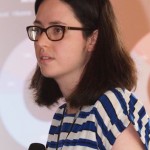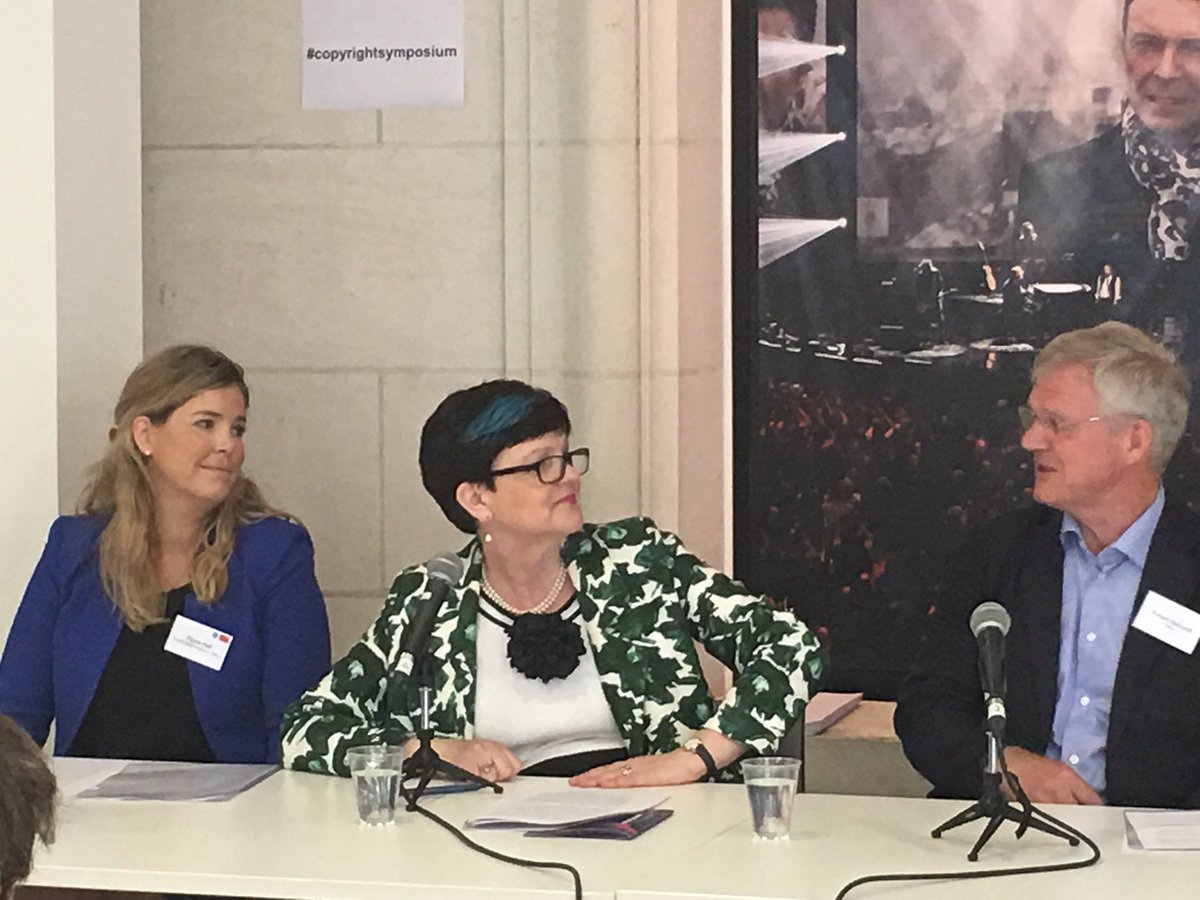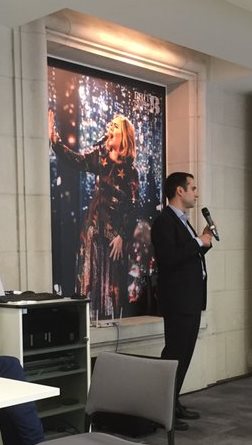 Post by Victoria Stobo, CREATe Postgraduate Researcher on attending the CREATe supported Copyright Education Symposium on 24 May in London.
Post by Victoria Stobo, CREATe Postgraduate Researcher on attending the CREATe supported Copyright Education Symposium on 24 May in London.
May 24th 2016 saw an unprecedented gathering of policymakers, academics, creative industry representatives, independent consultants and information professionals at the offices of the British Recorded Music Industry (BPI) in London. The event [conceived by Scott Walker and Prof. Ruth Soetendorp] was sponsored by CREATe, ALCS, CLA, ERA, PRS for Music, the Industry Trust for IP Awareness and supported by the UK Intellectual Property Office (IPO) . The aim of the symposium was to review the work of industry, academia and government in raising awareness of copyright law, and to explore how evaluation of data collection, research and education initiatives in this area might take shape.

Left to Right: Pippa Hall (chief economist IPO), Baroness Neville-Rolfe (IP Minister), Robert Ashcroft (CEO prsformusic).
Opening the event, Baroness Neville-Rolfe, IP Minister, observed that the creative industries contribute £84 billion per year to the UK economy, and are enjoying unprecedented growth. As a vital part of the cultural fabric of the nation, the next generation of creators must be supported and rewarded, and a better understanding of the law is essential to this process. Highlighting the importance of research (with reference to CREATe), she suggested a roadmap might be necessary to adequately assess the challenges and effectiveness of industry and academic interventions, and stated that she was looking forward to the assembled delegates finding a way forward.
Pippa Hall, Chief Economist at the IPO, said that IP policy should be based on robust evidence, and that while significant gaps in evidence still existed, especially across copyright and registered designs, we had come a long way in the last few years. In particular, she highlighted CREATe’s research as an example of excellent work being undertaken to address this gap. She outlined three areas where she felt the value and importance of IP could be raised, and where communication channels should be open both ways between industry and academia. The first was that we should share our research agendas: the IPO publishes theirs, and they are very happy to receive input into where that agenda should focus. The second observation was that resources are limited, and work should be undertaken to make sure there are no overlaps where research is being undertaken. She also emphasised working in partnership and increasing collaboration as a solution to the problem. Her final point was to open up and share data where possible: access to robust data is essential, and the IPO is happy to help build trust between industry and academia in this regard, perhaps advising on the use of trusted third parties to manage access to that data.
The morning was taken up with presentations from a variety of copyright awareness initiatives, including Matt Day from the BBC (Copyright Aware), Marianne Grant from the MPAA (Get it Right from a Legal Site), James Burke from Kantar Media (the IPO infringement-tracking study), and CREATe’s own Bartolomeo Melletti, presenting the CopyrightUser.org resource. Bart explained that the site content was created by independent experts, based on a bottom-up methodology, where creators’ and users’ most commonly asked questions about the law inform the guidance. He was also able to show that the site has had more than 100,000 unique visitors over the last 12 months, and that usage of the site is increasing.

Bart Meletti (CopyrightUser.org)
The impartiality and authoritativeness of CopyrightUser, along with the fact that it empowers users, rather than stating what they cannot do within the law, became a running theme for the day – after many of the afternoon’s workshop activities, the reported feedback included positive comments about the CopyrightUser resource. Impartiality, independence, authority and empowerment were keywords that were repeated throughout the event.
The rest of the day was taken up with workshop sessions, which considered a series of questions, from ‘How do we measure the effectiveness of copyright education programmes?’ and ‘How do we improve the use of research within the education and awareness policy-making process?’ to ‘What do our future research needs look like?’ and ‘How can stakeholders work better together on a common research agenda?’
Some of the key talking points that came out of these sessions included: the fact that copyright education might increase awareness of the law, but not necessarily have a positive or negative effect on infringement; the importance of everyone, from creators to users, being able to find the information on the law that they need; the current lack of leadership for copyright education; the likelihood of including copyright within the national curriculum; and potential opportunities to include it more effectively within continuing professional development for key professions such as teachers, librarians and information workers.
Looking to the future, discussions also included the value of linked and triangulated data, where different sources can be combined to created a richer, deeper picture of behaviour and consumption; the lack of a consensus on appropriate research questions, where and how research should take place, who should conduct it and how it should be disseminated; the role of honesty and transparency in building trust between industry and academia; and how to improve collaboration between academia, the government, the creative industries and the technology sector.

Martin Kretschmer, Thomas Dillan (WIPO), Baroness Estelle Morris
As part of a plenary panel summing up the day, Martin Kretschmer, Director of CREATe, said, “The relationship between academics and copyright interests has not always been easy. Today is a big step forward. We are listening to each other. I think we all agree now that copyright has had a credibility problem, and copyright awareness and education can only be addressed in that context.”
Martin gave two examples where credibility has become an issue: private copying is not permitted in the UK, and the problem of non-use has not been addressed. After 50 years, only 3% books and 7% of films are still commercially available. Continuing, he explained “A simple message on copyright will not work. We can’t treat consumers as objects. We can’t force people to spend money on entertainment. The starting point for education and awareness initiatives must be: understanding attitudes and behaviour. Referring to the work of Fleming, Parravano and Zizzo (2016), and Watson, Zizzo and Fleming (2014), he suggested that CREATe studies had offered empirical insights from behavioural economics and psychology.”
CREATe studies have identified 5 factors why people consume unlawfully. The first is financial utility: the content is free. The second is experiential utility, where the user has a desire to sample new content, to access niche content, or to build a collection. The third is technical utility: downloading this content is easy, so the availability of legal alternatives or perceived technical risks will reduce the intention to consume unlawfully. The fourth factor is social utility, where users reason that it’s what their peers and friends do. The final factor is moral utility, which covers the beliefs that users have about whether paying is justified: where does the money really go?
Martin observed that the first three factors can be addressed by new business models and better legal services, but also by the right sanctions. He explained that CREATe is currently conducting further experimental research exploring the fourth and fifth factors. He also suggested that CREATe could fufill the important role of independent broker, by creating resources that allow interrogation of the evidence. He highlighted three examples of this:
- The OMeBa tool, which allows exploration of IPO Kantar Infringement Tracker surveys: https://copyrightcentral.arts.gla.ac.uk/omeba/
- The Copyright Evidence Wiki, that provides a searchable catalogue of empirical evidence: http://www.copyrightevidence.org/evidence-wiki/index.php/Copyright_Evidence
- The Litigation Explorer (under development), which will allow interrogation of copyright litigation in High Court and IPEC.
Rosa Wilkinson (Innovation Director, IPO), summing up the day, stated that: “Everyone has the shared desire that the current and next generation understand copyright law. The Intellectual Property Education Map isn’t perfect, but it’s a start. In five years time, we’ll have a better understanding of the copyright landscape. There’s been lots of talk and lots of energy today. It’s important not to lose that momentum. We can help by improving the education map and continuing to share data, insights and studies.”
Highlights from the symposium will be presented in a short workshop on 24 June in London as part of the CREATe Festival 2016.
